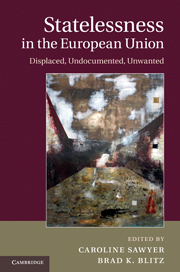Book contents
- Frontmatter
- Contents
- List of contributors
- List of cases
- List of conventions, covenants and treaties
- Acknowledgements
- List of abbreviations and acronyms
- PART I The issue
- PART II The research project
- 6 Research design and methodology of the country studies
- 7 De facto statelessness in the United Kingdom
- 8 Non-citizens in Slovenia: erasure from the register of permanent residents
- 9 The statelessness issue in Estonia
- 10 The sans papiers in France
- 11 Analysis: the practical and legal realities of statelessness in the European Union
- 12 Conclusions
- Bibliography
- Index
10 - The sans papiers in France
from PART II - The research project
Published online by Cambridge University Press: 17 February 2011
- Frontmatter
- Contents
- List of contributors
- List of cases
- List of conventions, covenants and treaties
- Acknowledgements
- List of abbreviations and acronyms
- PART I The issue
- PART II The research project
- 6 Research design and methodology of the country studies
- 7 De facto statelessness in the United Kingdom
- 8 Non-citizens in Slovenia: erasure from the register of permanent residents
- 9 The statelessness issue in Estonia
- 10 The sans papiers in France
- 11 Analysis: the practical and legal realities of statelessness in the European Union
- 12 Conclusions
- Bibliography
- Index
Summary
Being and becoming French
The original post-Revolutionary French Republican Constitution embodied a universalist ideal, making no distinction between French nationals and others. There have been many versions of the Constitution since then, and that approach has long since gone. The current French Constitution proclaims in its Preamble both the sovereignty of ‘le peuple’ and the principles of human rights. Article 1 guarantees the equality of all citizens before the law, and political groups are guaranteed participation in politics under Article 4, but the context is that of an electorate of all citizens. It does not include non-nationals, who may have legal rights granted by the French Constitution to foreigners, sometimes in pursuit of international treaty obligations, but who may alternatively find that they do not even have the right to remain in the country.
Before the Revolution, France practised the jus soli, so that those born on the monarch's territory belonged to his sphere of power and were accordingly French nationals. The jus soli, associated with monarchical allegiance, was replaced after the Revolution with a jus sanguinis system, so that being French was connected instead with the French people. This, however, meant that the children of migrants born in France were forever foreigners, even down the generations (something they often preferred, as it meant they were not obliged to perform military service). Elements of the jus soli were therefore later reintroduced, at first for the third generation.
- Type
- Chapter
- Information
- Statelessness in the European UnionDisplaced, Undocumented, Unwanted, pp. 253 - 280Publisher: Cambridge University PressPrint publication year: 2011
- 1
- Cited by



